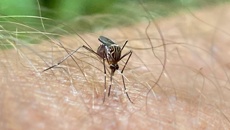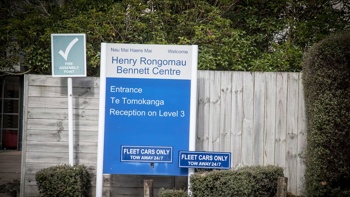
A solo mum says she ate one meal a day and sometimes slept on the hospital floor so she could afford to drive her late son 300km to and from his cancer treatments.
Sharon Smith, 53, would drive her son Ethan from Gore to Dunedin and back for chemotherapy every day for weeks at a time. It takes two hours to travel just over 150km each way.
"I'm diabetic but I could only afford one meal a day ... the cheaper the better. I'd usually have a pottle of yoghurt and a banana for tea," Smith told the Herald.
"My blood sugar levels were always dipping but I made sure I did everything I could for Ethan."
He was 23 years old when he died in July, five years after being diagnosed with leukaemia, a type of blood cancer. Under the Government's National Travel Assistance (NTA) scheme, Smith said, they could get about $200 reimbursed to cover petrol for about three trips.
"That wasn't nearly enough ... his last trip cost us $150," she said. They were also entitled to $100 for accommodation but, Smith said, no motel was that cheap.
On one occasion, Ethan had multiple surgeries at Dunedin Hospital and was required to stay for two weeks, so Smith slept on a La-Z-Boy that wouldn't recline.
"I ended up getting arthritis in my spine, it was really hard," she said.
"The bedrooms are that small that you can hardly swing a cat and they had a really small window seat with a swab on it but if I moved during the night, I'd end up on the floor and stay there."
Other times they would drive back to Gore that same day, Smith said.
- Health New Zealand Chair Rob Campbell: Restructuring is not an easy task
- Mayor of Dunedin is unaware of the reported cost-cutting in new Dunedin hospital
She described the financial toll and added stress from travel as massive.
"I just about got my power cut off because I couldn't afford to pay the bill ... there were times we'd have just $50 left for groceries for the week, for two people."
Smith said there were lots of people in a similar situation to them and the biggest complaint was usually how long it took to get one NTA payment through.
"When you are travelling every day for two weeks, only having weekends off, and they take six to eight weeks or longer to pay out — that's a lot of money. They should arrange for the money to be in your account before you travel or straight after you travel."
Smith also questioned why NTA rates hadn't been increased "in years" when petrol prices had "gone through the roof".
/cloudfront-ap-southeast-2.images.arcpublishing.com/nzme/BFP7HIHWGIQP3TBTJ5BD7ZB7UY.jpg)
Sharon Smith who is diabetic said her blood sugar levels were always dipping but she made sure she did everything she could for Ethan. Photo / ODT
Currently, the NTA scheme meant patients who travelled more than 50km for at least six appointments within one month could be reimbursed 28c per km for petrol and about $100 for accommodation.
Those rates have stayed the same for the last 13 years.
Cancer Society of New Zealand chief executive Lucy Elwood told the Herald the rising cost of living means more families "who are really hurting".
"You'd be struggling to find a bed in backpackers close to a hospital for that [$100] amount, which clearly isn't appropriate accommodation for patients who have just had complex surgery or are getting complex treatment."
Elwood said the money patients are entitled to sometimes also took up to eight weeks to be reimbursed.
"Some people can't afford to fill up their car and then wait that long to be paid back."
According to the society's Otago and Southland manager of support care, Marie Wales, one man had to travel 75km for treatment and refused.
"He just said 'I can't afford to go that far'."
/cloudfront-ap-southeast-2.images.arcpublishing.com/nzme/E3UORUINR3SOYMG5OVQGSQQHOM.jpg)
Patients are potentially missing out on life-saving treatment due to failures in the Government's National Travel Scheme. Photo / Getty Images
Another terminal elderly patient was driving 270km for radiation but had only five appointments so didn't qualify, Wales said.
"So someone who travels nearly 600km for one appointment doesn't qualify but someone who travels the same distance over six appointments does. How is that fair?"
Another woman from Wānaka was told by her doctor she had to travel 270km to Dunedin for treatment — but the only way you can be admitted at Dunedin Hospital was through the emergency department, Wales said.
"According to NTA, patients admitted through ED don't qualify. She was in hospital for two months. Her husband had to sleep on various people's couches until we found him and supported him."
In September 2018, the Ministry of Health released an NTA policy recommendations report which identified a number of issues needing to be addressed. This included limitations to the eligibility criteria, inefficient payment tools and the petrol and accommodation rates.
The recommendations were put on the back burner once Covid-19 struck.
"It needs an overhaul, what NTA entitles patients to is woeful given the cost-of-living increases that patients have seen," Elwood said.
At the very least, she said, baseline rates should urgently be bumped up to match IRD — which for petrol was 83 cents per kilometre. Accommodation should be at least $150, and higher for those travelling to big cities like Auckland or Wellington.
A Te Whatu Ora (Health NZ) spokesperson said they were aware of the need to review the NTA scheme to ensure it was fit for the purpose and equitable for all sections of the population.
"This is one of many significant issues that need to be considered as we work to modernise our health system."
Take your Radio, Podcasts and Music with you









